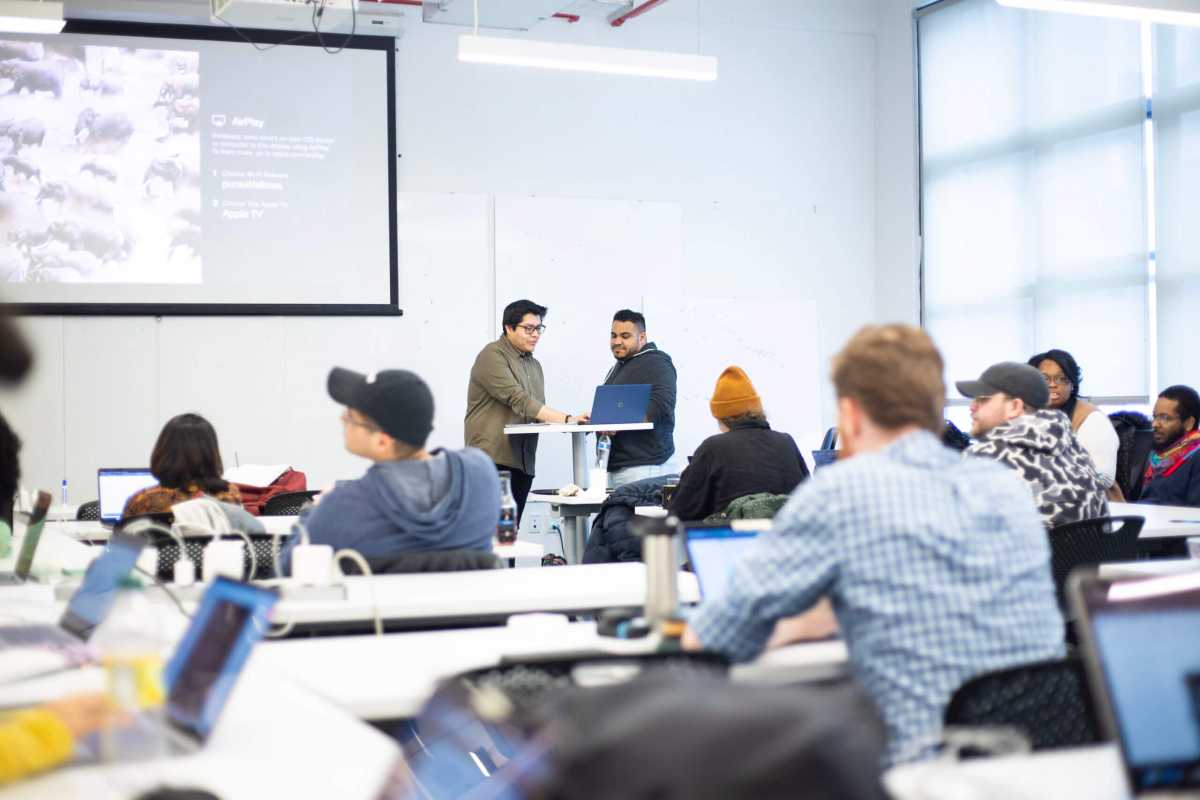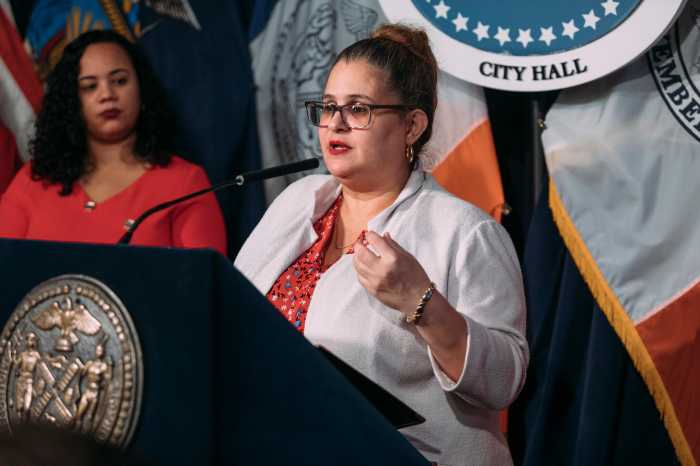Just a few years ago, Jovanni Luna, a software engineer at Foursquare, didn’t know how to code. Now, the Brooklyn-born, Bronx-raised 28-year-old is making six figures at a tech company that’s worth around $390 million. He got here with a little help from his friends, and by applying for a tech fellowship created just for New Yorkers.
Pursuit, based in Long Island City, works to train underserved New Yorkers for their first jobs in the technology field. The nonprofit offers a year-long fellowship for adults from diverse communities to code and build careers. The fellowship has no upfront fees for fellows, but graduates are expected to pay a portion — 5% to 15% depending on their salary range — of their salary to Pursuit after they are hired at their first tech jobs.
“When I discovered Pursuit, I came in with zero coding experience,” Luna told amNewYork Metro. “I went from not knowing how to code and then I was able to build a web application.”
Growing up in The Bronx, Luna, who identifies as Latino, said tech seemed like a non-traditional pursuit, especially in his Brooklyn and Bronx networks. He enrolled at Baruch College to study international business, but realized midway that path wasn’t for him.
Luna was facing financial woes and after taking a step away from Baruch, he was figuring out which way to pivot. Then Luna’s work colleague at one of his day jobs told him about a fellowship that teaches people how to code — and it came at just the right time.
“I was still dealing with college debt from Baruch,” Luna said. “I didn’t get my degree and I didn’t have a job to show for it.”
At the time, what Luna knew about the tech industry came from stories about Bill Gates and Steve Jobs. He thought only certain people thrived in the tech field like scientists and logical thinkers but found that there are opportunities for everybody.
“I always thought it was something that only the smartest people in the world can do,” Luna said. “It was really, really daunting and I wanted to self teach myself, but I couldn’t at that age.”
His only exposure to coding up until then was a basic computer science elective course in middle school, where he worked with HTML and CSS (Cascading Style Sheets). But that elective didn’t lead to future opportunities for Luna. Still, he continued to be influenced by technology, especially at his day job working at Best Buy.
Luna went to an information session in Williamsburg, and said he was hooked, especially after he learned that Pursuit wouldn’t charge fellows for the program until after they are settled at their first tech jobs.
“I was at the time of my life where I want to have a big change to pursue my goals,” Luna said. “Everybody had this similar goal I think that created a little bit of solidarity and community among us to push each other forward.”
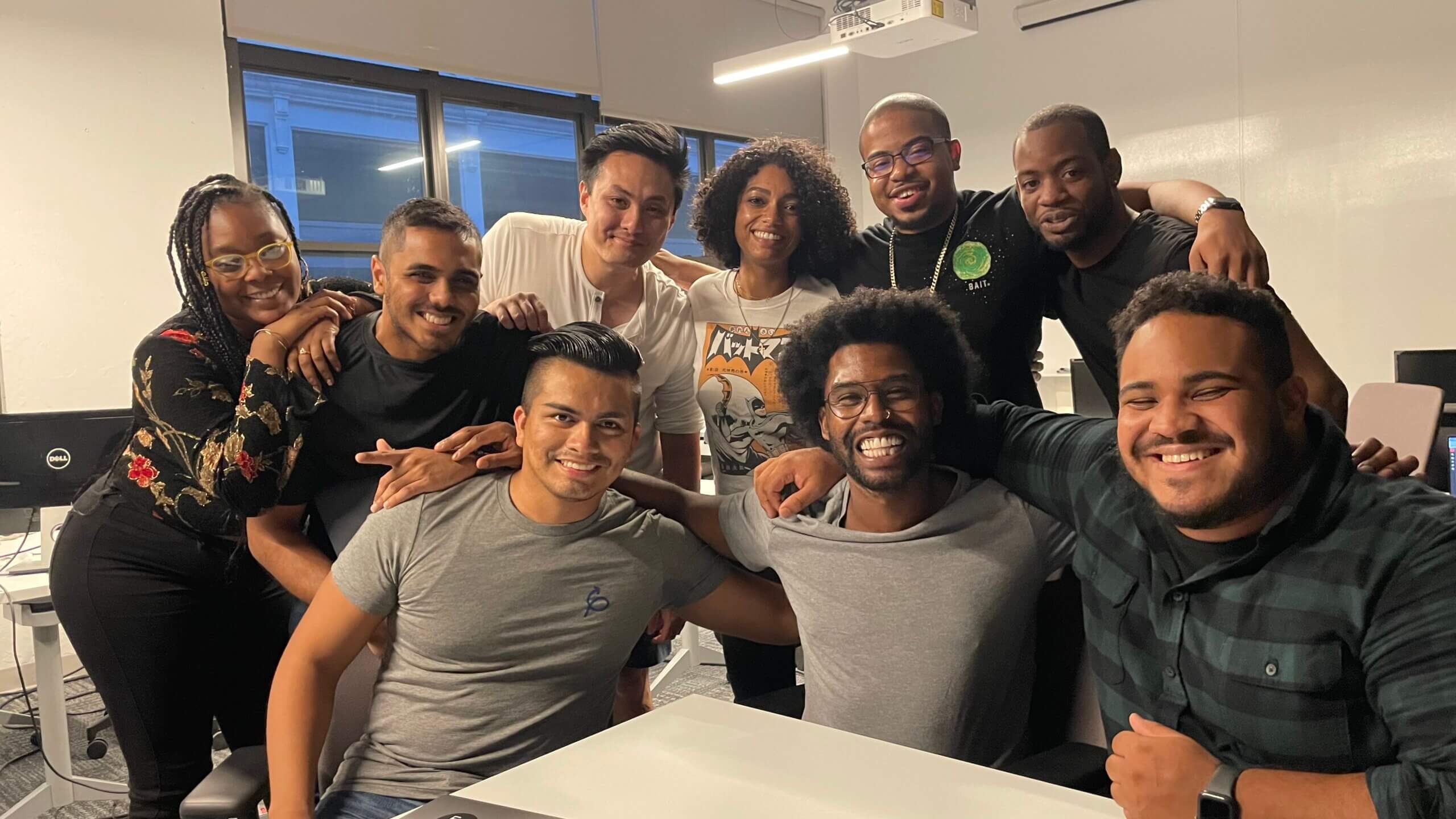
He joined Pursuit’s fellowship with 25 other fellows in September 2019 and attended classes in Long Island City during the evenings after his day jobs and on weekends.
“People got here at 7 p.m. to start class already exhausted from the day and the last thing you want to do is learn how to code,” Luna said. “But we’ve definitely pushed each other.”
While intimidating at first, he realized that learning how to code was like constructing a giant Lego project: block by block.
“It’s super intimidating at first, especially when you see all these lines of code and colors and a whole bunch of things that don’t make sense to you right away,” Luna said. “But it’s like anything: You have to learn little by little.”
His cohort was diverse and predominantly people of color and women, which Luna acknowledged is still not reflective of the current tech industry’s workforce demographics. In the past, Pursuit fellows have been 50% women, 70% Black or Hispanic, and 50% immigrants.
“Us having the opportunity to get into those tech jobs are going to change the demographic of the tech industry,” Luna said. “I think the tech industry is pushing that way.”
When the COVID-19 pandemic shut down in-person classes, Luna continued to work through his fellowship remotely. As it turned out, the work-from-home arrangement was a blessing in disguise.
“When I got hired, we were working remotely,” Luna said. “It was a pretty easy transition.”
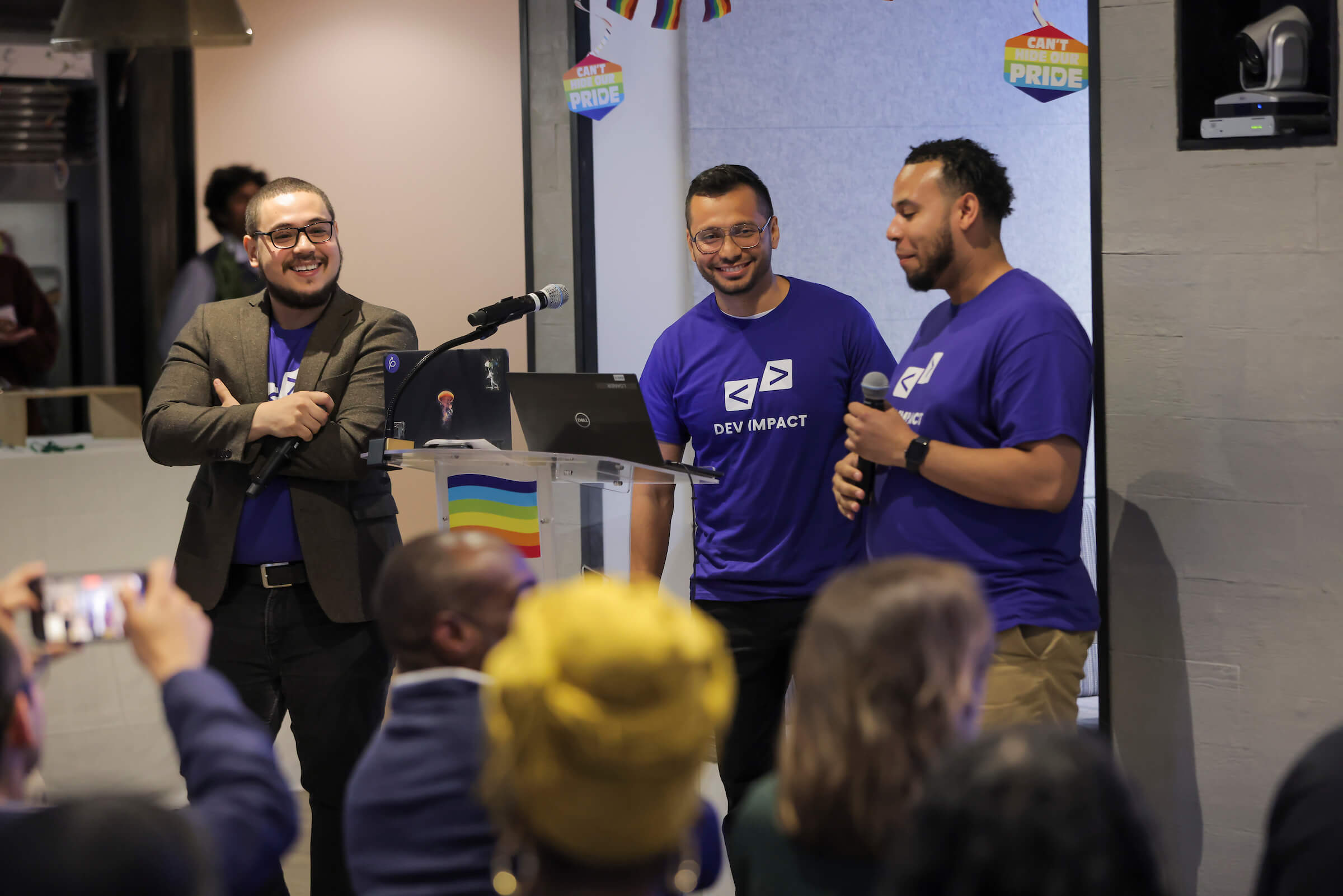
But how could a fellowship prepare someone to enter a field saturated with highly educated individuals, many with advanced degrees from legacy universities?
Luna pointed to the fellowship’s capstone project that challenged him to put all his knowledge to use. With two other fellows, Luna created a web application called “Trip Hikers” for people who want to travel, but didn’t have a group to travel with.
“We created an app where if you wanted to travel somewhere, you could join someone’s trip,” Luna said. “We even tried to come up with a business model how we can make money on that.”
As soon as he finished the capstone, Luna worked with Pursuit’s admission and employment team to find his first tech job. He participated in mock interviews with software engineers from tech companies who volunteered their time to conduct behavioral and technical interviews with fellows. After leaving his fellowship, Luna continued to sharpen his skills and apply for jobs — even doing eight interviews in one day — before an opportunity to apply at Foursquare came around.
“I felt prepared,” Luna said “Opportunity meets preparedness.”
He chose Foursquare because the company’s location-driven mission paralleled the capstone he had finished at Pursuit. He was the only one from his cohort to be hired at Foursquare, while other fellows went on to work at Chase Bank, Peloton, and Thirty Madison. Luna was able to double the income he used to make — around $45,000 a year — and after two years at Foursquare, met his goal of making six figures before the age of 30.
“All that work I did finally paid off,” Luna said. “It was the best feeling just knowing I have a future from that point.”
Pursuit recently announced a proposal to get more low-income New Yorkers into tech jobs through a city council initiative.
The nonprofit is urging the New York City Council to expand its “Diversity, Inclusion, and Equity in Tech” initiative and increase funding to $1.5 million as part of the city’s 2024 fiscal year budget. By doing so, Pursuit believes it could reach around 10,000 New Yorkers over three years, launch bridge programs to build foundational math and literacy skills, and then connect 1,000 New Yorkers with good-paying jobs in tech.
“I think it can be a gateway to getting out of poverty and even creating generational wealth,” Luna said.
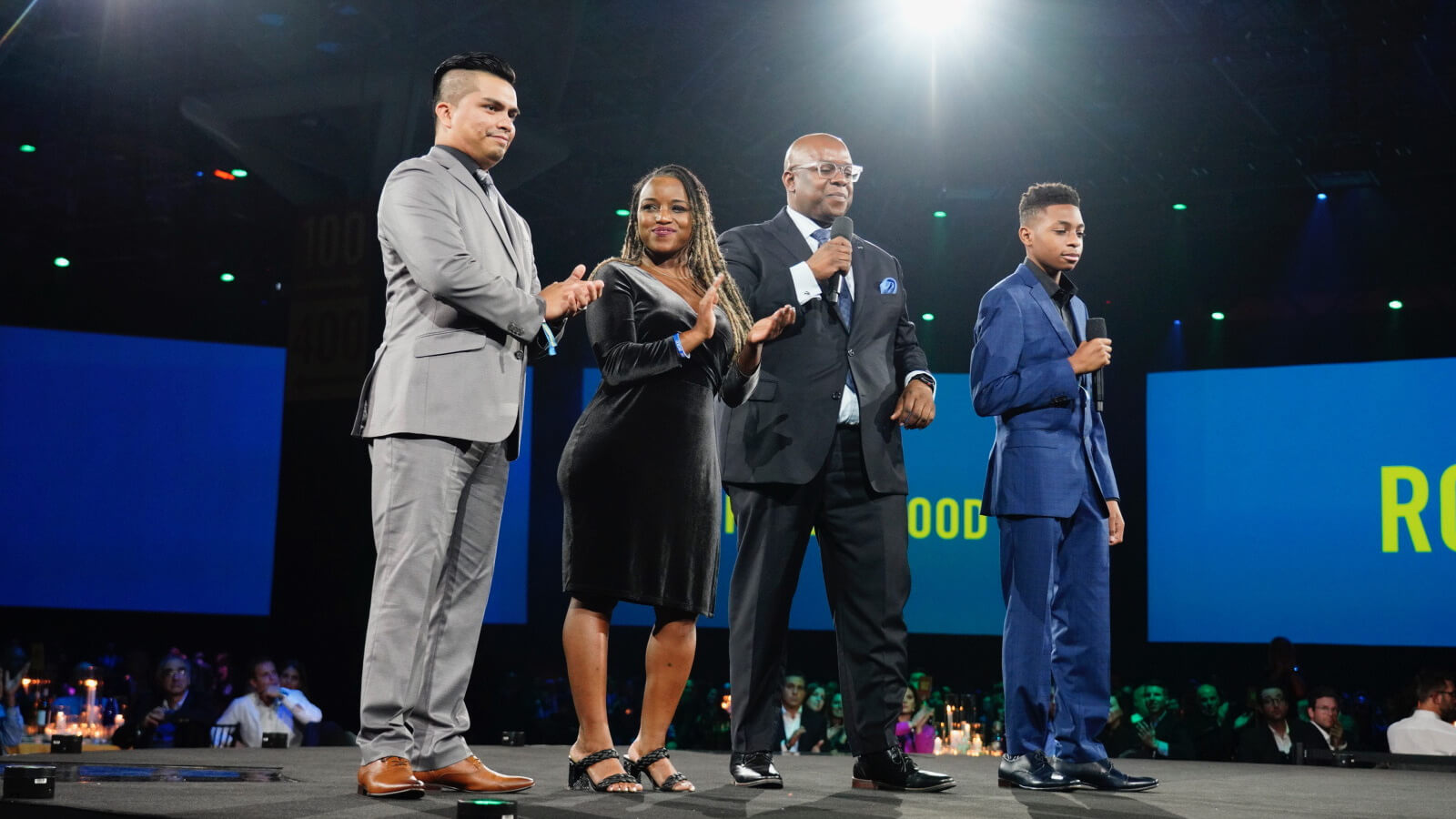
Jukay Hsu, CEO and co-founder of Pursuit, said that the company has worked with the New York City Council for more than a decade to ensure low-income people have access to good-paying tech jobs. A native New Yorker himself and raised in Flushing, Queens, Hsu said tech companies should have a workforce that reflects New York City’s population itself.
“New York City has become one of the country’s leading technology hubs, but we need to make sure our tech workforce matches the diversity of the five boroughs,” Hsu told amNewYork Metro. “We believe that every New Yorker should know that these jobs are for them, but the reality is that there are systemic barriers that keep these jobs at a reach for too many people, especially New Yorkers in low-income communities.”
Hsu co-founded Pursuit in 2011 and the fellowship was created two years later. The fellowship is intensive, and along with continued job support, lasts a total of four years. Hsu acknowledged that one of the biggest barriers preventing more New Yorkers from entering the tech field is a four-year degree.
“It’s really important that we work with employers so that we don’t have these barriers,” Hsu said. “It’s really about creating that environment so that people can enter the workforce and be successful.”
Pursuit fellows can typically triple their incomes after completing the fellowship, Hsu said. Many fellows come to the program with an average salary of $18,000. After fellows land their first tech job, they can start off earning up to $90,000 — the typical starting salary for software engineers in New York City. The average salary for software engineers in New York City is around $150,000.
“It just increases from there,” Hsu said. “That’s how we create the livelihoods, so that people can afford to live here and raise a family.”
Hsu has found supporters within City Council: Council Member Jennifer Gutiérrez, who chairs the City Council’s Technology Committee, and Council Member Justin Brannon, the chair of the Committee on Finance. Gutiérrez has acknowledged Pursuit’s work, calling it “important.”
“Pursuit is doing this important work, by creating equity and enriching the technology sector with new employees with diverse perspectives and experiences,” Gutiérrez said. “Any program that has the ability to connect thousands of low-income New Yorkers with high-paying jobs is worth the investment to make NYC a globally competitive technology hub.”
The City Council’s Diversity, Inclusion, and Equity in Tech Initiative was launched in 2012 and provides funding for workforce development nonprofits, such as Pursuit, to engage underserved communities and connect them with job opportunities.
“Over the past six, seven years, at least 100 residents from NYCHA have come into our programs,” Hsu said. “We want to do more of that.”
Pursuit’s latest proposal is pushing for further expansion to more low-income New Yorkers. Hsu said the next goal is spread the fellowship’s reach across all 51 of New York City Council’s districts. Currently, Pursuit has reached around 20 city council districts, according to Hsu.
“What we’re doing now is asking the city to expand this into every neighborhood,” Hsu said. “Because that’s how the New York tech industry should grow.”
Luna only wishes he was exposed to computer science and technology earlier. He’s now teaching his little brother what he wasn’t able to have at his age: coding lessons. He’s since told more of his friends about his experience, in the hopes that they could follow a similar success.
“I wish I would have started younger to have more experience at my age, compared to other software engineers,” Luna said. “My friends from The Bronx and Harlem also had no coding knowledge and just to see them also achieving their goals is pretty great. We like to see our community rise up with us.”



